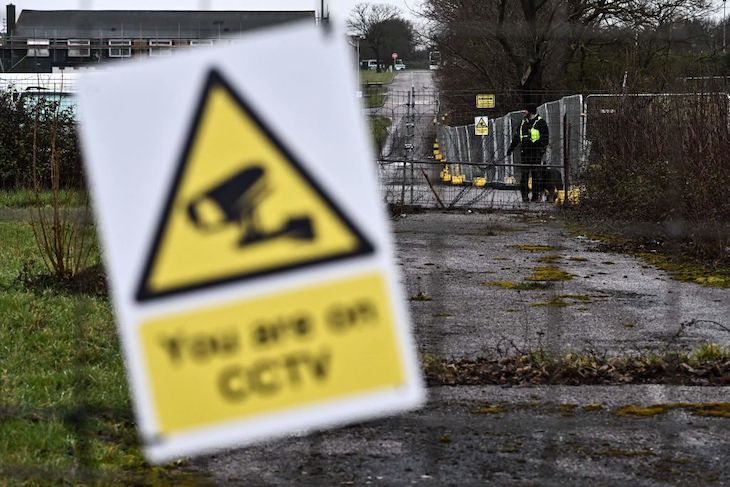Frank Sinatra once sang about the seductive properties of bright and shiny ephemera. ‘Her heart will sing, singa-linga, wearing baubles, bangles and beads,’ crooned Ol’ Blue Eyes. There is a temptation for anyone cynical about politics – that’s nearly all of us by now – to view the Government’s announcement of planned new asylum-seeker accommodation as a similarly knowing exercise in buttering us up with something eye-catching but insubstantial.
Barges, barracks and airfields make up Immigration Minister Robert Jenrick’s latest attempt to get the electorate in the mood to couple-up with the Conservatives at the next election. These are the favoured and suitably Spartan-sounding new locations for thousands of the young men who have arrived in the country illegally on small boats.
We are certainly entitled to wonder whether it is just a distraction, given that those accommodated in this way are likely to be free to come and go as they please rather than being held in secure detention. But that would not be entirely fair.
Robert Jenrick deserves praise for his dogged determination to bring the hotels regime to an end
Having briefed the cabinet that providing hotel rooms for 40,000 unlawful arrivals plus nearly another 10,000 who have come in under authorised schemes now costs taxpayers almost £7 million a day and constitutes a significant pull factor for further illegal immigration, it falls to Jenrick to sell the idea of a new and less salubrious accommodation regime.
The acquisition of a giant barge, similar to those used for oil rig workers, is the most attention-grabbing aspect of Jenrick’s latest contribution to Rishi Sunak’s mission to ‘stop the boats’. The other, former military installations so far earmarked for housing asylum applicants currently tucked up in hotel rooms – the RAF airfield at Scampton in Lincolnshire and the Ministry of Defence Police site at Wethersfield in Essex which is replete with vacant Nissen huts – have already attracted strong local opposition.
In fact, Jenrick deserves a measure of praise for his dogged determination to bring the hotels regime to an end. In so far as there is a public relations element to his latest announcement, it is as much directed towards future waves of potential Channel-crossers who have heard via TikTok about the commodious accommodation presently awaiting them, as it is to the British electorate.
Community relations in towns with hotels turned over to housing asylum seekers have also come under increasing strain in recent months, with demonstrations and counter-demonstrations resulting in scuffles and creating the potential for far more serious violence.
Sending out a signal that the era of cancelled weddings and flagship station hotels putting-up vast numbers of young men who have knowingly gate-crashed Britain will shortly come to an end is a necessary intervention.
But it simply won’t work if the removals arm of the policy is long-delayed. The barge will have to be docked somewhere and locals won’t like that when they hear about it, just as residents in Scampton and Wethersfield are already protesting. Lots of other sites are also going to be needed if the Home Office’s ludicrously expensive block-booking of hotel rooms is to be ended.
Only when it has secured the power to fast-track illegal arrivals out of Britain – back to their countries of origin or, failing that, to third countries such as Rwanda – will the Government be well-placed to stem the human tide crossing the English Channel.
When Sunak made stopping the boats one of his five key pledges at the start of the year, he told a press conference:
‘The country will be the judge of whether we as a Government are straining every sinew to focus on their priorities and deliver meaningful progress.’
The sinews are straining again today and anyone who wishes to see the large-scale abuse of our asylum system brought to an end should be glad. It shows the Tories still fear the wrath of the electorate should they fail in that mission. Jenrick’s new policy is best filed under ‘necessary, but not sufficient’.







Comments